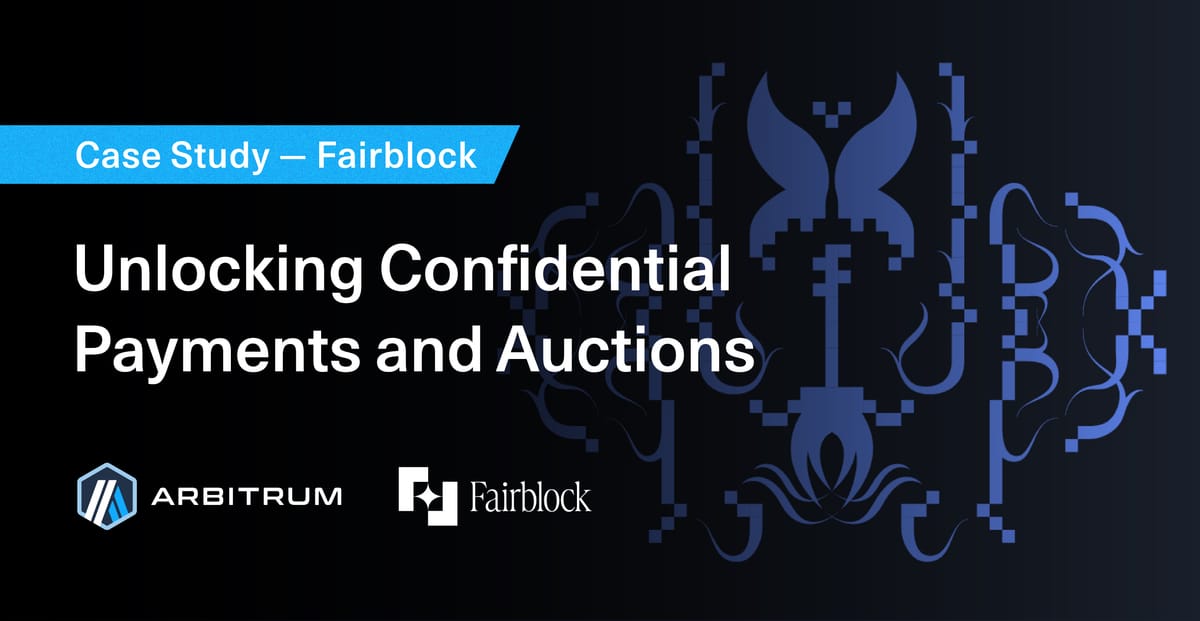How Fairblock is Unlocking Confidential Payments and Auctions on Arbitrum

In the ever-evolving world of DeFi, confidentiality and transparency often find themselves at odds with one another. Proofs often require transparency and exposure, whereas confidentiality requires this information to be obfuscated.
For traders, this means avoiding telegraphing their strategies. For businesses, this means treating sales data as sensitive IP. For institutions, this means having auditability without broadcasting the amount onchain. Fairblock, web3’s confidential execution layer, seeks to bridge this gap, utilizing Arbitrum Stylus to make it all possible.
What is Fairblock?
At the very core, Fairblock’s mission is to build trustworthy rails for open finance using confidential computing. To make this possible, Fairblock’s work currently involves two major directions: confidential stablecoin transfers and protected trading.
Confidential transfers are designed to encrypt sensitive financial activities and competitive intelligence that should not be visible to the entire market. Protected trading hides sensitive information, such as bidding rates, lending terms or order intents, is hidden from prying eyes until execution.
Fairblock’s first major product in the protected trading category is Fairates, a fixed-rate lending platform built on Arbitrum. Fairates uses leaderless sealed-bid auctions to discover a single clearing rate, allowing borrowers and lenders to interact without slippage, manipulation, or the need to trust a central auctioneer.
The foundation for Fairates is Fairblock’s general-purpose auction engine, DeBid, which was selected as one of the recipients of the Arbitrum Foundation’s Stylus Sprint program.
DeBid takes a process that traditionally ran on centralized servers and brings it onchain. Participants submit bids in encrypted form onto the blockchain, and once the auction closes, validators collectively decrypt the bids using multi-party computation (MPC) and threshold identity-based encryption (IBE).
This design is able to remove the need for a central authority, prevents frontrunning and manipulation, and creates a neutral mechanism that can be repurposed far beyond lending.
Made Possible with Stylus
DeBid relies on advanced cryptography to keep bids sealed until an auction is closed, and EVM alone was not able to reach this threshold. MPC-based leaderless auctions rely on cryptographic curves and operations that can only be efficiently implemented using Rust, precompiles, or a coprocessing setup. Stylus makes DeBid possible by providing a Rust-based execution environment inside Arbitrum. Rust is a battle-tested programming language that can now be used to run heavy cryptographic routines natively onchain.
So, rather than outsourcing decryption and execution to fully-trusted centralized coprocessors, sensitive computations (such as confidential transfers, decryption of bids and MPC that jointly decrypts them) were able to be verified within Arbitrum itself, removing the need for users to place trust in external services.
In addition to being able to write smart contracts using Rust, Stylus is also interoperable with Solidity contracts, which means that DeBid was able to tap into Arbitrum’s existing DeFi ecosystem, integrating lending protocols like Fairates, confidential transfers, and intent protocols, and leveraging the $19 billion that is currently secured on Arbitrum.According to Fairblock, the ultimate goal of all these integrations is straightforward: to secure better prices and rates by eliminating inefficiencies and exploitation from intermediaries, and to establish trustworthy rails for institutional adoption by safeguarding sensitive financial information onchain.
Beyond DeFi
The implications of the architecture that Fairblock is building extend beyond DeFi. For institutional players, such as PayPal, Stripe and Robinhood, confidentiality is a necessity that ensures they are regulatory compliant and remain competitive. Fairblock is actively working on confidentiality for cross-boarder payments and private data marketplaces for AI.
Fairblock’s work shows that confidentiality and transparency can coexist through careful cryptographic design despite often being viewed as opposites. DeBid and Fairates are only just the beginning. The same auction primitives can be applied in the future to token launches, intent matching, real-world asset sales, and many other use cases.


































